Europe · Events · Regions · Spain · Travel Miscellany · Western Europe
5 sizzling Summer festivals in Malaga, Spain
Already the summer season beckons. Especially here on the southernmost Mediterranean coast of Andalusia, the sun over Malaga province begins to intensify as the longest day approaches. And though the sun blazes a scorching path throughout summer, nothing in Malaga sizzles so much as the festivals between spring and autumn.
Every village, town and city holds at least two unique festivals annually, providing a veritable non-stop fiesta season for much of the year. While there are numerous dedicated Flamenco and culinary festivals, the vast majority of all celebrations contain at least an element of this most famous of Andalusian art forms in Flamenco song, music and dance, and all will certainly have delicious local cuisine and plenty of flowing wine. The festivals of Malaga all display a distinctive and fascinating combination of history, culture, art and cuisine; but most importantly, that Spanish warmth of character that is as scintillating as the Mediterranean sun.
Here is a round up of some of the most impressive and enjoyable of the Malagueñan summer festivals.
Day of the Virgin del Carmen, 13-16 July
The Virgin del Carmen, patron saint and protector of seafarers, logically makes for a popular figure along the vast coastline of Malaga province in this Christian country. The entire coast, once largely comprised of small fishing villages, recalls a proud maritime history rich with tradition and ritual, dating back centuries. It’s impossible to overlook the religious roots of this festival as the activities begin with an afternoon mass and procession with the Virgin herself paraded through the streets and to the beach, where she will usually then be carried into the sea accompanied by loyal followers and ecstatic revelers. However, like any and all Andalusian celebrations, the mood eventually turns very festive with music, song and dance, plus local delicacies washed down with copious amounts of wine and beer.
 Many beach communities in Malaga will celebrate the event across the weekend from 13-16 July, though Nerja and Fuengirola are perhaps most notable. Both stage impressive fireworks displays at sunset in addition to the processions, and carry on with music well into the night. Nerja includes a touching ceremony before the famous El Salvador church there, honouring the oldest sea widow and the oldest seaman in the village.
The “vendimia” festivals, August into September
The “vendimia” is not one festival but many across the region to celebrate the grape harvest. The dates can vary slightly, depending on the timing of the grapes themselves. The excitement begins well before the actual fiesta as locals and interested visitors pitch in to gather the grapes, mostly Moscatel (Muscat) here, often from alarmingly steep vineyards that defy assistance even from the most obdurate of donkeys. One would expect vast quantities of grapes, raisins, wine and sherry from such an event, and one would not be disappointed. And again, no festival here would be complete without a nightlong progression of exhibitions, concerts and Flamenco, dancing and delicious nibbles to match.
Many beach communities in Malaga will celebrate the event across the weekend from 13-16 July, though Nerja and Fuengirola are perhaps most notable. Both stage impressive fireworks displays at sunset in addition to the processions, and carry on with music well into the night. Nerja includes a touching ceremony before the famous El Salvador church there, honouring the oldest sea widow and the oldest seaman in the village.
The “vendimia” festivals, August into September
The “vendimia” is not one festival but many across the region to celebrate the grape harvest. The dates can vary slightly, depending on the timing of the grapes themselves. The excitement begins well before the actual fiesta as locals and interested visitors pitch in to gather the grapes, mostly Moscatel (Muscat) here, often from alarmingly steep vineyards that defy assistance even from the most obdurate of donkeys. One would expect vast quantities of grapes, raisins, wine and sherry from such an event, and one would not be disappointed. And again, no festival here would be complete without a nightlong progression of exhibitions, concerts and Flamenco, dancing and delicious nibbles to match.
 Notable vendimias in Malaga include the Night of Wine in Competa (15 August), the Raisin Festival in La Viñuela (15 September), and the Fiesta of the Moscatel Grape in Iznate (11 August).
The Festival of the Three Cultures, Frigiliana, 24-27 August
This well organised festival celebrates the history, traditions and Andalusian legacies of the three locally influential cultures of the Islamic Moors, Jews and Christians. It’s a bit of a fantasy time warp with villagers and participants dressed in period garb with artisanal products being crafted in the manner of centuries ago, street performers in character (think fire breathers and belly dancers) and a wonderful culinary aspect that includes two tapas routes with the participation of dozens of local bars and restaurants. One route highlights the culinary legacy of the Moors in Spain while the other typifies Christian contributions; if you make it through the entire route (and can still walk) you’ll earn a well deserved T-shirt for remembrance sake.
Notable vendimias in Malaga include the Night of Wine in Competa (15 August), the Raisin Festival in La Viñuela (15 September), and the Fiesta of the Moscatel Grape in Iznate (11 August).
The Festival of the Three Cultures, Frigiliana, 24-27 August
This well organised festival celebrates the history, traditions and Andalusian legacies of the three locally influential cultures of the Islamic Moors, Jews and Christians. It’s a bit of a fantasy time warp with villagers and participants dressed in period garb with artisanal products being crafted in the manner of centuries ago, street performers in character (think fire breathers and belly dancers) and a wonderful culinary aspect that includes two tapas routes with the participation of dozens of local bars and restaurants. One route highlights the culinary legacy of the Moors in Spain while the other typifies Christian contributions; if you make it through the entire route (and can still walk) you’ll earn a well deserved T-shirt for remembrance sake.
 On a more serious side the festival includes various conferences and exhibitions to discuss and highlight the artistic and cultural contributions of each of these cultural groups. The festival celebrates the centuries of harmonious cohabitation of the three cultures in this region of Andalucia, but it also remembers Frigiliana as the site of the final battle between Moors and Christians once that harmony came to a violent end.
The Royal Fair of Antequera, 24-26 August
Antequera sits inland from the Malaga coast, bordering the province of Cordoba, and was already a strategically situated settlement before the Romans happened upon it. So established was the town already that even the Romans called it “the ancient city”, from which the name Antequera derives. Dolmens (thought to be ancient ritualistic burial sites) dating back 5,000 years are well preserved at the outskirts of the city, and were awarded a UNESCO World Heritage designation in 2016. It’s been suggested that the city has the largest number of churches in all of Spain, and it also features its own Alcazaba, or Moorish fortress in the style of the Alhambra of Granada.
On a more serious side the festival includes various conferences and exhibitions to discuss and highlight the artistic and cultural contributions of each of these cultural groups. The festival celebrates the centuries of harmonious cohabitation of the three cultures in this region of Andalucia, but it also remembers Frigiliana as the site of the final battle between Moors and Christians once that harmony came to a violent end.
The Royal Fair of Antequera, 24-26 August
Antequera sits inland from the Malaga coast, bordering the province of Cordoba, and was already a strategically situated settlement before the Romans happened upon it. So established was the town already that even the Romans called it “the ancient city”, from which the name Antequera derives. Dolmens (thought to be ancient ritualistic burial sites) dating back 5,000 years are well preserved at the outskirts of the city, and were awarded a UNESCO World Heritage designation in 2016. It’s been suggested that the city has the largest number of churches in all of Spain, and it also features its own Alcazaba, or Moorish fortress in the style of the Alhambra of Granada.
 So there is much to see and investigate in Antequera at any time of year; but, the annual festival in August is the perfect time to experience all of it as the locals proudly celebrate the city’s impressive and extensive history. The townsfolk claim this festival to be one of the oldest in the country, and the weekend of the festival, the party barely pauses; there’s a daytime festival in one location and a nighttime festival in another, with virtually all of the city turning into a festive scene of revelry.
The Festival of Malaga, 12-19 August
Saving the best for last, it should come as no surprise that the ultimate summer festival in the province of Malaga is in the city of Malaga itself. The festival of Malaga dates back centuries and commemorates the incorporation of Malaga into the Castilian Catholic Monarchy in 1487. The Spanish are famed for their love of a good party and with more than 500 years of momentum behind this festival it takes the crown for the biggest and best of the Andalucian summer fiestas. Until recently it ran for a full ten days and nights on end; now a mere week-long festival, it kicks off with fireworks and concerts on the beach and continues with energetic daily street parties throughout the charismatic old centre and on into the night at the fairgrounds just outside of the city. It’s a virtual non-stop party with something for everyone of every age: there are street performers and Flamenco song and dance, equestrian and bullfighting displays, and general merry making in the unmistakably Spanish style. It’s worth going just to see what the “señoritas” will be wearing and you can’t go wrong even if you don’t have a schedule of the many events. This is a festival that must be seen to be believed!
So there is much to see and investigate in Antequera at any time of year; but, the annual festival in August is the perfect time to experience all of it as the locals proudly celebrate the city’s impressive and extensive history. The townsfolk claim this festival to be one of the oldest in the country, and the weekend of the festival, the party barely pauses; there’s a daytime festival in one location and a nighttime festival in another, with virtually all of the city turning into a festive scene of revelry.
The Festival of Malaga, 12-19 August
Saving the best for last, it should come as no surprise that the ultimate summer festival in the province of Malaga is in the city of Malaga itself. The festival of Malaga dates back centuries and commemorates the incorporation of Malaga into the Castilian Catholic Monarchy in 1487. The Spanish are famed for their love of a good party and with more than 500 years of momentum behind this festival it takes the crown for the biggest and best of the Andalucian summer fiestas. Until recently it ran for a full ten days and nights on end; now a mere week-long festival, it kicks off with fireworks and concerts on the beach and continues with energetic daily street parties throughout the charismatic old centre and on into the night at the fairgrounds just outside of the city. It’s a virtual non-stop party with something for everyone of every age: there are street performers and Flamenco song and dance, equestrian and bullfighting displays, and general merry making in the unmistakably Spanish style. It’s worth going just to see what the “señoritas” will be wearing and you can’t go wrong even if you don’t have a schedule of the many events. This is a festival that must be seen to be believed!
 Alan Hazel is Owner and Director of Cortijo El Carligto. Cortijo el Carligto is a private Andalucían hideaway and luxury rental estate in the hills of Malaga, Spain, overlooking the Mediterranean.
If you would like to be a guest blogger on A Luxury Travel Blog in order to raise your profile, please contact us.
Alan Hazel is Owner and Director of Cortijo El Carligto. Cortijo el Carligto is a private Andalucían hideaway and luxury rental estate in the hills of Malaga, Spain, overlooking the Mediterranean.
If you would like to be a guest blogger on A Luxury Travel Blog in order to raise your profile, please contact us.
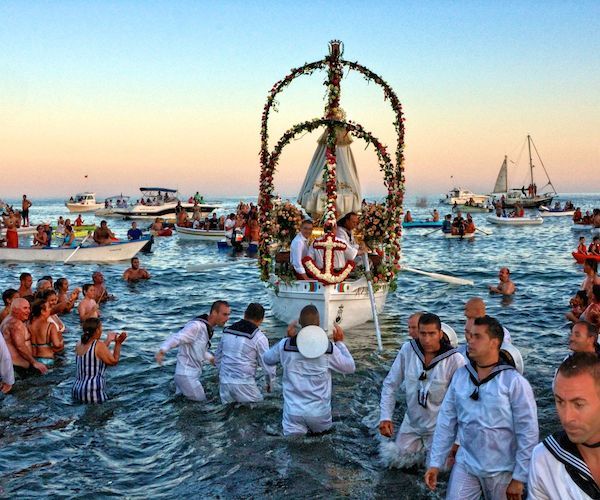 Many beach communities in Malaga will celebrate the event across the weekend from 13-16 July, though Nerja and Fuengirola are perhaps most notable. Both stage impressive fireworks displays at sunset in addition to the processions, and carry on with music well into the night. Nerja includes a touching ceremony before the famous El Salvador church there, honouring the oldest sea widow and the oldest seaman in the village.
The “vendimia” festivals, August into September
The “vendimia” is not one festival but many across the region to celebrate the grape harvest. The dates can vary slightly, depending on the timing of the grapes themselves. The excitement begins well before the actual fiesta as locals and interested visitors pitch in to gather the grapes, mostly Moscatel (Muscat) here, often from alarmingly steep vineyards that defy assistance even from the most obdurate of donkeys. One would expect vast quantities of grapes, raisins, wine and sherry from such an event, and one would not be disappointed. And again, no festival here would be complete without a nightlong progression of exhibitions, concerts and Flamenco, dancing and delicious nibbles to match.
Many beach communities in Malaga will celebrate the event across the weekend from 13-16 July, though Nerja and Fuengirola are perhaps most notable. Both stage impressive fireworks displays at sunset in addition to the processions, and carry on with music well into the night. Nerja includes a touching ceremony before the famous El Salvador church there, honouring the oldest sea widow and the oldest seaman in the village.
The “vendimia” festivals, August into September
The “vendimia” is not one festival but many across the region to celebrate the grape harvest. The dates can vary slightly, depending on the timing of the grapes themselves. The excitement begins well before the actual fiesta as locals and interested visitors pitch in to gather the grapes, mostly Moscatel (Muscat) here, often from alarmingly steep vineyards that defy assistance even from the most obdurate of donkeys. One would expect vast quantities of grapes, raisins, wine and sherry from such an event, and one would not be disappointed. And again, no festival here would be complete without a nightlong progression of exhibitions, concerts and Flamenco, dancing and delicious nibbles to match.
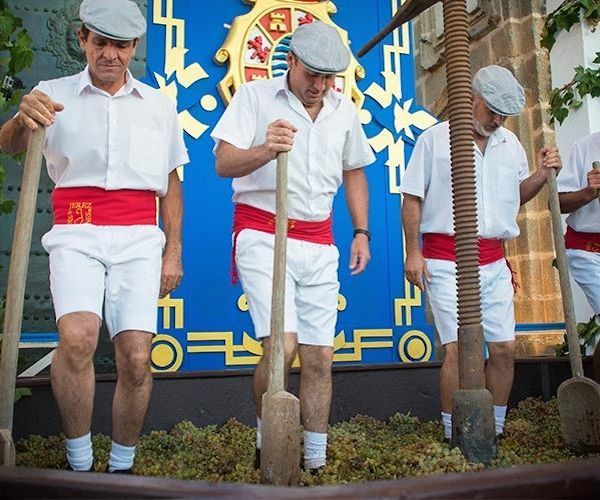 Notable vendimias in Malaga include the Night of Wine in Competa (15 August), the Raisin Festival in La Viñuela (15 September), and the Fiesta of the Moscatel Grape in Iznate (11 August).
The Festival of the Three Cultures, Frigiliana, 24-27 August
This well organised festival celebrates the history, traditions and Andalusian legacies of the three locally influential cultures of the Islamic Moors, Jews and Christians. It’s a bit of a fantasy time warp with villagers and participants dressed in period garb with artisanal products being crafted in the manner of centuries ago, street performers in character (think fire breathers and belly dancers) and a wonderful culinary aspect that includes two tapas routes with the participation of dozens of local bars and restaurants. One route highlights the culinary legacy of the Moors in Spain while the other typifies Christian contributions; if you make it through the entire route (and can still walk) you’ll earn a well deserved T-shirt for remembrance sake.
Notable vendimias in Malaga include the Night of Wine in Competa (15 August), the Raisin Festival in La Viñuela (15 September), and the Fiesta of the Moscatel Grape in Iznate (11 August).
The Festival of the Three Cultures, Frigiliana, 24-27 August
This well organised festival celebrates the history, traditions and Andalusian legacies of the three locally influential cultures of the Islamic Moors, Jews and Christians. It’s a bit of a fantasy time warp with villagers and participants dressed in period garb with artisanal products being crafted in the manner of centuries ago, street performers in character (think fire breathers and belly dancers) and a wonderful culinary aspect that includes two tapas routes with the participation of dozens of local bars and restaurants. One route highlights the culinary legacy of the Moors in Spain while the other typifies Christian contributions; if you make it through the entire route (and can still walk) you’ll earn a well deserved T-shirt for remembrance sake.
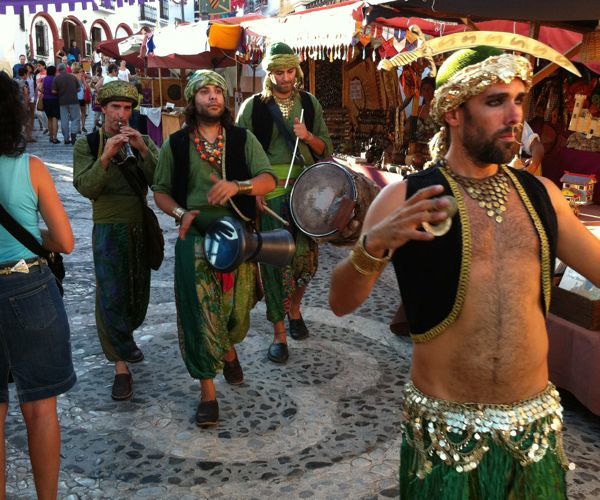 On a more serious side the festival includes various conferences and exhibitions to discuss and highlight the artistic and cultural contributions of each of these cultural groups. The festival celebrates the centuries of harmonious cohabitation of the three cultures in this region of Andalucia, but it also remembers Frigiliana as the site of the final battle between Moors and Christians once that harmony came to a violent end.
The Royal Fair of Antequera, 24-26 August
Antequera sits inland from the Malaga coast, bordering the province of Cordoba, and was already a strategically situated settlement before the Romans happened upon it. So established was the town already that even the Romans called it “the ancient city”, from which the name Antequera derives. Dolmens (thought to be ancient ritualistic burial sites) dating back 5,000 years are well preserved at the outskirts of the city, and were awarded a UNESCO World Heritage designation in 2016. It’s been suggested that the city has the largest number of churches in all of Spain, and it also features its own Alcazaba, or Moorish fortress in the style of the Alhambra of Granada.
On a more serious side the festival includes various conferences and exhibitions to discuss and highlight the artistic and cultural contributions of each of these cultural groups. The festival celebrates the centuries of harmonious cohabitation of the three cultures in this region of Andalucia, but it also remembers Frigiliana as the site of the final battle between Moors and Christians once that harmony came to a violent end.
The Royal Fair of Antequera, 24-26 August
Antequera sits inland from the Malaga coast, bordering the province of Cordoba, and was already a strategically situated settlement before the Romans happened upon it. So established was the town already that even the Romans called it “the ancient city”, from which the name Antequera derives. Dolmens (thought to be ancient ritualistic burial sites) dating back 5,000 years are well preserved at the outskirts of the city, and were awarded a UNESCO World Heritage designation in 2016. It’s been suggested that the city has the largest number of churches in all of Spain, and it also features its own Alcazaba, or Moorish fortress in the style of the Alhambra of Granada.
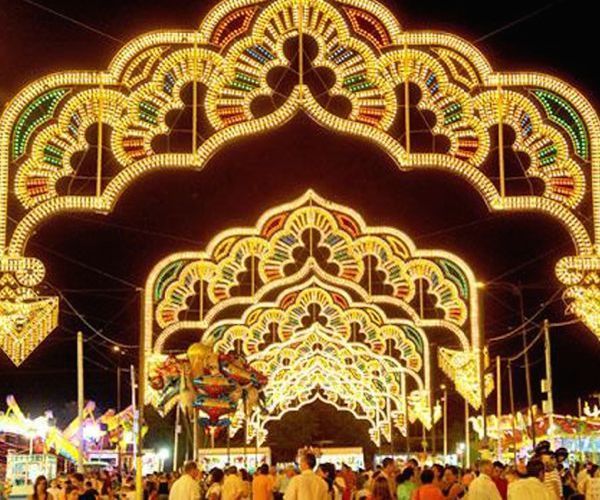 So there is much to see and investigate in Antequera at any time of year; but, the annual festival in August is the perfect time to experience all of it as the locals proudly celebrate the city’s impressive and extensive history. The townsfolk claim this festival to be one of the oldest in the country, and the weekend of the festival, the party barely pauses; there’s a daytime festival in one location and a nighttime festival in another, with virtually all of the city turning into a festive scene of revelry.
The Festival of Malaga, 12-19 August
Saving the best for last, it should come as no surprise that the ultimate summer festival in the province of Malaga is in the city of Malaga itself. The festival of Malaga dates back centuries and commemorates the incorporation of Malaga into the Castilian Catholic Monarchy in 1487. The Spanish are famed for their love of a good party and with more than 500 years of momentum behind this festival it takes the crown for the biggest and best of the Andalucian summer fiestas. Until recently it ran for a full ten days and nights on end; now a mere week-long festival, it kicks off with fireworks and concerts on the beach and continues with energetic daily street parties throughout the charismatic old centre and on into the night at the fairgrounds just outside of the city. It’s a virtual non-stop party with something for everyone of every age: there are street performers and Flamenco song and dance, equestrian and bullfighting displays, and general merry making in the unmistakably Spanish style. It’s worth going just to see what the “señoritas” will be wearing and you can’t go wrong even if you don’t have a schedule of the many events. This is a festival that must be seen to be believed!
So there is much to see and investigate in Antequera at any time of year; but, the annual festival in August is the perfect time to experience all of it as the locals proudly celebrate the city’s impressive and extensive history. The townsfolk claim this festival to be one of the oldest in the country, and the weekend of the festival, the party barely pauses; there’s a daytime festival in one location and a nighttime festival in another, with virtually all of the city turning into a festive scene of revelry.
The Festival of Malaga, 12-19 August
Saving the best for last, it should come as no surprise that the ultimate summer festival in the province of Malaga is in the city of Malaga itself. The festival of Malaga dates back centuries and commemorates the incorporation of Malaga into the Castilian Catholic Monarchy in 1487. The Spanish are famed for their love of a good party and with more than 500 years of momentum behind this festival it takes the crown for the biggest and best of the Andalucian summer fiestas. Until recently it ran for a full ten days and nights on end; now a mere week-long festival, it kicks off with fireworks and concerts on the beach and continues with energetic daily street parties throughout the charismatic old centre and on into the night at the fairgrounds just outside of the city. It’s a virtual non-stop party with something for everyone of every age: there are street performers and Flamenco song and dance, equestrian and bullfighting displays, and general merry making in the unmistakably Spanish style. It’s worth going just to see what the “señoritas” will be wearing and you can’t go wrong even if you don’t have a schedule of the many events. This is a festival that must be seen to be believed!
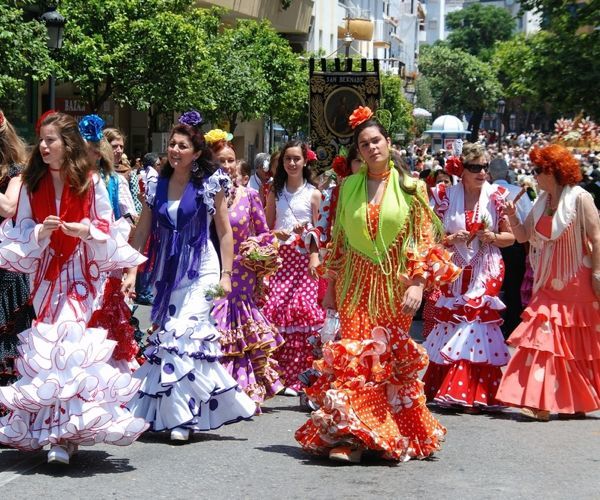 Alan Hazel is Owner and Director of Cortijo El Carligto. Cortijo el Carligto is a private Andalucían hideaway and luxury rental estate in the hills of Malaga, Spain, overlooking the Mediterranean.
If you would like to be a guest blogger on A Luxury Travel Blog in order to raise your profile, please contact us.
Alan Hazel is Owner and Director of Cortijo El Carligto. Cortijo el Carligto is a private Andalucían hideaway and luxury rental estate in the hills of Malaga, Spain, overlooking the Mediterranean.
If you would like to be a guest blogger on A Luxury Travel Blog in order to raise your profile, please contact us.Did you enjoy this article?
Receive similar content direct to your inbox.


Wow I didn’t know there were so many festivals. I am always so fascinated with festivals and carnivals they always bring so many people together. I have always found my best experience visiting somewhere new has when something as wonderful as these events has been on. Did you find the locals welcoming and encouraging you to take part? Did you get to do some grape stomping?
Hi, yes, the fiestas are a wonderful way to explore the culture and traditions! With the Andalusian fiestas the locals are always in top spirits, everyone with a smile, and very welcoming to those of us that want to join in. I didn’t get in on the grape stomping specifically, but I have been involved in others. It’s always a memorable and enjoyable affair!
I think it’s brilliant that Malaga is making a real success out of these festivals. Fun and festivities are a great way of handing down traditions from one generation to the next. It’s preserving the costumes and customs from bygone ages in a very hands-on way, lifting the past from dry and boring history books. Long may these festivals continue!.
My friends and I normally go to the international fair in Fuengirola, but as you know with this dreadful Coronavirus outbreak they have cancelled it.
Please can you tell me if they have live music of different genres st any of these latter Malaga festivals?
Muchas Grassia’s
Mr Michael Holland